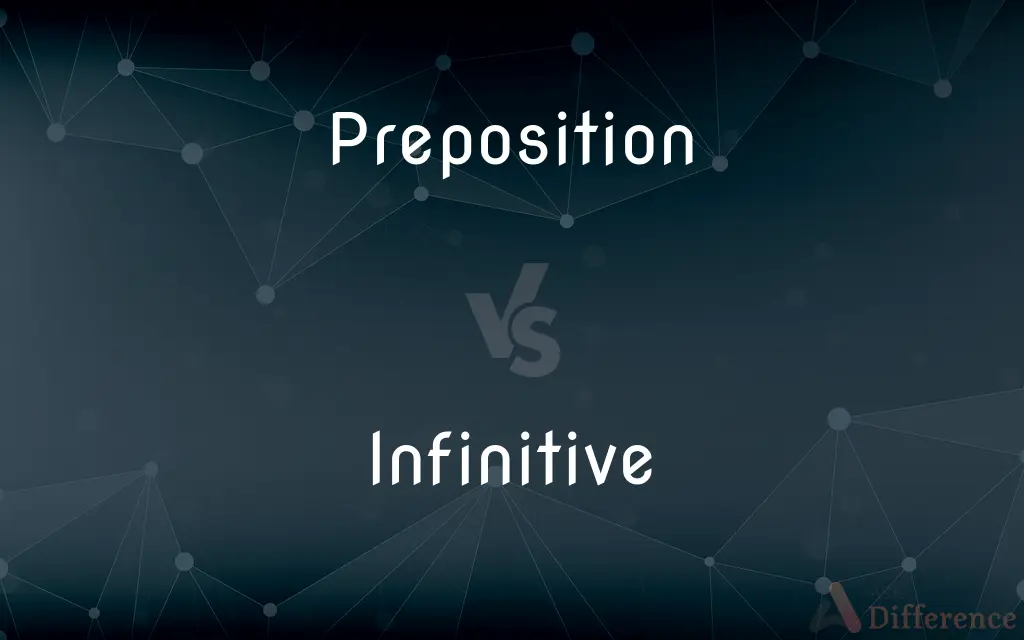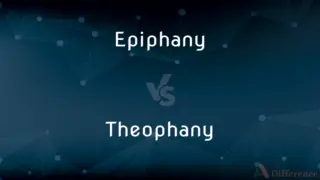Preposition vs. Infinitive — What's the Difference?
Edited by Tayyaba Rehman — By Urooj Arif — Updated on April 3, 2024
A preposition shows the relationship between nouns/pronouns and elements in a sentence, often indicating time, place, or direction. An infinitive is a verb's base form, usually with "to," denoting an action or state without a subject reference.

Difference Between Preposition and Infinitive
Table of Contents
ADVERTISEMENT
Key Differences
Prepositions are used to show how different parts of a sentence are connected, indicating relationships involving time ("before dinner"), place ("at the park"), direction ("to the office"), and more. They are key to providing context and clarity in sentences, allowing for the expression of complex relationships and ideas. Infinitives, on the other hand, serve as the building blocks for verbs, often introduced by "to" (though "to" can be omitted in some cases, such as after modal verbs). Infinitives can function as nouns, adjectives, or adverbs within a sentence. For example, in "To run is fun," the infinitive "to run" acts as the subject of the sentence, demonstrating its role as a noun.
For instance, "The book on the table is mine" uses "on" to specify the book's location in relation to the table. Infinitives can express purposes, intentions, or potential actions without being confined to any specific tense or subject.
While prepositions are static, providing structure and meaning based on their position and the words they link, infinitives are dynamic, capable of conveying actions or states in a general, timeless manner. Prepositions require a complement, such as a noun or pronoun, to complete their meaning, whereas infinitives can stand alone or with modifiers and complements to express a complete idea.
The distinction is also evident in their syntactic roles: prepositions always act as connectors within a sentence, while infinitives can play multiple roles (subject, object, complement, or modifier), showcasing their versatility in expressing actions or states. Understanding the difference between these two helps in mastering sentence construction and the nuanced expression of ideas.
Comparison Chart
Definition
A word that shows the relationship between its object and another word in the sentence.
The basic form of a verb, often preceded by "to," used to express an action or state in a general sense.
ADVERTISEMENT
Function
Indicates time, place, direction, cause, and more.
Serves as nouns, adjectives, or adverbs; expresses purpose, intention, or action.
Example Uses
"On the table," "before sunset," "under the bridge."
"To eat," "to run," "to be seen."
Requirement
Needs a complement (noun or pronoun) to convey meaning.
Can stand alone or with modifiers and complements; does not require a specific subject.
Syntactic Role
Acts as connectors, showing the relationship between elements in a sentence.
Can function as subject, object, complement, or modifier within a sentence.
Compare with Definitions
Preposition
Requires an object to complete its meaning.
She is at home.
Infinitive
Basic form of a verb, often with "to."
To write is to express oneself.
Preposition
Connects nouns or pronouns to other words in a sentence.
The cat jumped off the counter.
Infinitive
Can be used without "to" after certain verbs.
She can sing beautifully.
Preposition
Indicates location, time, or method.
We walked through the park.
Infinitive
Versatile in function, appearing in various sentence positions.
His wish is to travel around the world.
Preposition
Cannot stand alone; it is part of a prepositional phrase.
He arrived after dinner.
Infinitive
Can act as the subject or object in a sentence.
To learn a new language is my goal.
Preposition
Adds context and clarity to sentences.
The notes on the piano are faded.
Infinitive
Expresses purpose or intention.
She left early to catch the train.
Preposition
A word governing, and usually preceding, a noun or pronoun and expressing a relation to another word or element in the clause, as in ‘the man on the platform’, ‘she arrived after dinner’, ‘what did you do it for?’.
Infinitive
Infinitive (abbreviated INF) is a linguistics term for certain verb forms existing in many languages, most often used as non-finite verbs. As with many linguistic concepts, there is not a single definition applicable to all languages.
Preposition
A word or phrase placed typically before a substantive and indicating the relation of that substantive to a verb, an adjective, or another substantive, as English at, by, with, from, and in regard to.
Infinitive
A verb form that functions as a substantive while retaining certain verbal characteristics, such as modification by adverbs, and that in English may be preceded by to, as in To go willingly is to show strength or We want him to work harder, or may also occur without to, as in She had them read the letter or We may finish today. See Usage Note at split infinitive.
Preposition
To position or place in position in advance
Artillery that was prepositioned at strategic points in the desert.
Infinitive
(grammar) The infinitive mood or mode (a grammatical mood).
Preposition
Any of a class of non-inflecting words typically employed to connect a following noun or a pronoun, in an adjectival or adverbial sense, with some other word: a particle used with a noun or pronoun (in English always in the objective case) to make a phrase limiting some other word.
Infinitive
(grammar) A non-finite verb form considered neutral with respect to inflection; depending on language variously found used with auxiliary verbs, in subordinate clauses, or acting as a gerund, and often as the dictionary form.
Preposition
An adposition.
Infinitive
(grammar) A verbal noun formed from the infinitive of a verb.
Preposition
(obsolete) A proposition; an exposition; a discourse.
Infinitive
(grammar) Formed with the infinitive.
Preposition
To place in a location before some other event occurs.
It is important to preposition the material before turning on the machine.
Infinitive
Unlimited; not bounded or restricted; undefined.
Preposition
A word employed to connect a noun or a pronoun, in an adjectival or adverbial sense, with some other word; a particle used with a noun or pronoun (in English always in the objective case) to make a phrase limiting some other word; - so called because usually placed before the word with which it is phrased; as, a bridge of iron; he comes from town; it is good for food; he escaped by running.
Infinitive
Unlimited; not bounded or restricted; undefined.
Preposition
A proposition; an exposition; a discourse.
He made a long preposition and oration.
Infinitive
An infinitive form of the verb; a verb in the infinitive mood; the infinitive mood.
Preposition
A function word that combines with a noun or pronoun or noun phrase to form a prepositional phrase that can have an adverbial or adjectival relation to some other word
Infinitive
In the manner of an infinitive mood.
Preposition
(linguistics) the placing of one linguistic element before another (as placing a modifier before the word it modifies in a sentence or placing an affix before the base to which it is attached)
Infinitive
The uninflected form of the verb
Infinitive
Formed with the infinitive;
An infinitive phrase
Infinitive
Not having inflections to indicate tense
Common Curiosities
Why are prepositions important?
Prepositions are important because they provide essential context in sentences, clarifying relationships involving time, place, direction, and more.
What is a preposition?
A preposition is a word that indicates the relationship between its object and another element in the sentence, often in terms of location, time, or method.
Can infinitives exist without "to"?
Yes, infinitives can appear without "to," especially after modal verbs (can, should, may) or certain other verbs (let, make, see).
How do prepositions and infinitives differ in function?
Prepositions show relationships between elements in a sentence, while infinitives express actions or states in a non-finite form, serving various grammatical roles.
What is an infinitive?
An infinitive is the base form of a verb, typically preceded by "to," that can function as a noun, adjective, or adverb in a sentence.
How are infinitives used to express purpose?
Infinitives often express purpose by indicating why an action is performed, as in "She studies to learn," where "to learn" explains the purpose of studying.
Can a prepositional phrase contain an infinitive?
Yes, a prepositional phrase can contain an infinitive, especially when the infinitive functions as the object of the preposition, e.g., "She is interested in to learn more about it."
Are there exceptions to using "to" with infinitives?
Yes, besides modal verbs, expressions like "had better," "would rather," and verbs like "help" can also be followed by an infinitive without "to."
Can infinitives be the main verb in a sentence?
While infinitives cannot act as the main verb in a finite verb phrase, they can be the main part of a subject or object, playing a central role in expressing the action or state.
How does understanding prepositions and infinitives improve writing?
Mastering prepositions and infinitives enhances sentence variety, clarity, and the ability to precisely convey complex relationships and nuanced ideas in writing.
Share Your Discovery

Previous Comparison
Hall vs. Concourse
Next Comparison
Epiphany vs. TheophanyAuthor Spotlight
Written by
Urooj ArifUrooj is a skilled content writer at Ask Difference, known for her exceptional ability to simplify complex topics into engaging and informative content. With a passion for research and a flair for clear, concise writing, she consistently delivers articles that resonate with our diverse audience.
Edited by
Tayyaba RehmanTayyaba Rehman is a distinguished writer, currently serving as a primary contributor to askdifference.com. As a researcher in semantics and etymology, Tayyaba's passion for the complexity of languages and their distinctions has found a perfect home on the platform. Tayyaba delves into the intricacies of language, distinguishing between commonly confused words and phrases, thereby providing clarity for readers worldwide.














































